Group 1 and 2 metabotropic glutamate receptors play differential roles in hippocampal long-term depression and long-term potentiation in freely moving rats
- PMID: 9096163
- PMCID: PMC6573649
- DOI: 10.1523/JNEUROSCI.17-09-03303.1997
Group 1 and 2 metabotropic glutamate receptors play differential roles in hippocampal long-term depression and long-term potentiation in freely moving rats
Abstract
This study examined the role of metabotropic glutamate receptors (mGluRs) in hippocampal long-term depression (LTD) in vivo. The group 1 mGluR antagonist (S)4-carboxyphenylglycine (4CPG), group 1/2 antagonist (RS)-alpha-methyl-4-carboxyphenylglycine (MCPG), and group 2 antagonists (RS)-alpha-methylserine-O-phos-phate monophenyl ester (MSOPPE) and (2S)-alpha-ethylglutamic acid (EGLU) were used. The NMDA receptor antagonist D(-)-2-amino-5-phosphonopentanoic acid (AP5) was used to examine the NMDA receptor contribution to the observed LTD. Adult male Wistar rats underwent implantation of stimulating and recording electrodes into the Schaffer collaterals and CA1 stratum radiatum, respectively. After recovery of 5-7 d, the field EPSP was measured from freely moving animals. Drugs were applied either before or after 1 Hz low-frequency train (LFT) or 100 Hz stimulation via a cannula implanted in the lateral cerebral ventricle. Nine hundred pulses at 1 Hz produced an LTD that was marked and long-lasting. This LTD was completely inhibited by pre-LFT application of AP5. MCPG inhibited LTD from 2 hr post-LFT. 4CPG partially impaired LTD. MSOPPE and EGLU completely blocked induction of LTD, although short-term depression remained intact. MSOPPE did not block long-term potentiation (LTP) induced by 100 Hz stimulation, whereas 4CPG produced a significant inhibition. When MSOPPE was present, LTD could not be induced either before or after LTP induction, whereas LTD could be induced in an identical protocol in vehicle-injected animals. These results suggest a differential role for mGluRs in NMDA receptor-dependent hippocampal LTD in vivo. Group 1 mGluRs may play a role in both LTD and LTP, whereas group 2 mGluRs may be critically involved only in LTD induction.
Figures
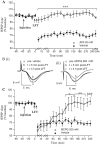
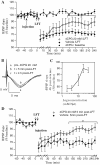

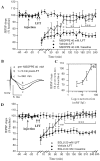
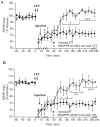

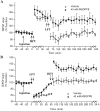
References
-
- Abe T, Sugihara H, Nawa H, Shigemoto R, Mizuno N, Nakanishi S. Molecular characterization of a novel metabotropic glutamate receptor mGluR 5 coupled to inositol phosphate/Ca2+ signal transduction. J Biol Chem. 1992;267:13361–13368. - PubMed
-
- Aiba A, Kano M, Chen C, Stanton ME, Fox GD, Herrup K, Zwingman TA, Tonegawa S. Deficient cerebellar long-term depression and impaired motor learning in mGluR1 mutant mice. Cell. 1994a;79:377–388. - PubMed
-
- Aiba A, Chen C, Herrup K, Rosenmund C, Stevens CF, Tonegawa S. Reduced hippocampal long-term potentiation and context-specific deficit in associative learning in mGluR 1 mutant mice. Cell. 1994b;79:365–375. - PubMed
-
- Bashir ZI, Jane DE, Sunter DC, Watkins JC, Collingridge GL. Metabotropic glutamate receptors contribute to the induction of long-term depression in the CA1 region of the hippocampus. Eur J Pharmacol. 1993;239:265–266. - PubMed
-
- Bear MF, Malenka RC. Synaptic plasticity: LTP and LTD. Curr Opin Neurobiol. 1994;4:389–399. - PubMed
MeSH terms
Substances
LinkOut - more resources
Full Text Sources
Miscellaneous
